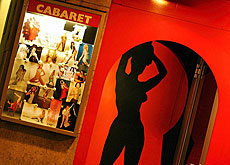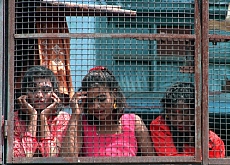Swiss sex industry is thriving

The number of prostitutes and sex clubs has risen over the past few years, but the industry has become more violent, says a federal police internal security report.
Prostitution in Switzerland generates an annual turnover of SFr3.2 billion ($2.65 billion). This upsurge in activity is also reflected in the parallel rise in prostitution-related human trafficking cases.
The number of prostitutes in Zurich has increased by 20 per cent since 2003, according to the 2005 annual report.
In canton Basel, a new brothel opened every two weeks while the number of prostitutes went up in Geneva by 50 per cent from 700 to over 1,000. Around 14,000 prostitutes worked in Switzerland in 2005, the majority of whom were immigrants.
Police warn the number of women brought into Switzerland illegally from eastern Europe to work in the sex trade will rise as bilateral agreements with the European Union on the free movement of people are phased in over the coming years.
Brigitte Honauer, a former dancer and cabaret manager from canton Solothurn, is critical of the recent growth, blaming the bars and saunas that employ illegal sex workers.
“The girls who work in those kind of places are not there legally,” said Honauer. “The police carry out raids, but the very next day they are replaced by a whole new set of girls. We have been on about it for years but seemingly nothing can be done.”
Prostitution is legal in Switzerland but heavily regulated to try to control and reduce the more undesirable consequences, such as forced prostitution, sexually transmitted diseases, the locations of brothels and links with criminal organisations.
In their annual report, the police highlight the rise in human trafficking cases, the majority of which are linked to prostitution.
Human trafficking
The police estimate that there could be between 1,500 and 3,000 victims of human trafficking in Switzerland at present.
In 2005 tougher measures taken at the cantonal and national level against traffickers have led to a rise in the number of cases going to court, says the report.
The victims of human trafficking prostitution rings are mostly women recruited in their home countries, who enter Switzerland illegally, lured by the promise of huge profits.
The ringleaders and their victims generally come from central Europe (Hungary, Slovakia, and Romania), the former Soviet Union (Ukraine and Moldova), Lithuania, Latin America (Brazil and the Dominican Republic), Southeast Asia (Thailand and Cambodia), and, to a lesser extent, Africa.
Once in Switzerland the reality can be very different from what was first promised.
Traffickers often force victims into prostitution, and in many cases subject them to physical and sexual violence, threaten them or their families, encourage drug addiction, withhold their documents, and confine them.
Many victims are forced to work in salons or clubs to pay for travel expenses and forged documents, and find themselves dependent on the traffickers.
Violent boom
Sex can be a very lucrative business. Clubs and massage parlours tend to attract criminal elements from Switzerland and abroad, say the police.
“And with such huge profits up for grabs, criminals take higher risks,” said Jürg Bühler, from the Federal Police Office.
The authorities say that the rise in the supply, with more girls and clubs, is destabilising the industry.
“There are turf wars going on over each group’s share of the cake. New gangs are moving in and pushing the old ones out, resulting in shootings and arson attacks on rivals’ clubs and bars,” said Bühler.
In 2005 several attacks and gunfights were reported at sex establishments in canton Solothurn and a well-known figure in prostitution circles was assassinated in Zurich.
swissinfo, Simon Bradley with agencies
Prostitution is legal in Switzerland but prostitutes have to register with city authorities and health authorities and get regular health checks.
Pimping is illegal and uncommon: most prostitutes operate independently from small studios via mobile phones. They cannot display their wares.
Human trafficking in persons can carry a prison sentence of up to 20 years and coercing a person into prostitution is punishable with up to ten years in prison. Besides trafficking for the purpose of sexual exploitation, legislation is being amended to make trafficking to exploit labour and the removal of human organs punishable offences.
L permits were created in 1975 and allow women from countries that do not have a free labour accord with Switzerland to work as dancers in cabaret clubs for up to eight months.
Switzerland has one of the highest rates of genital herpes in the western world, with an estimated 19% of the population infected.

In compliance with the JTI standards
More: SWI swissinfo.ch certified by the Journalism Trust Initiative



You can find an overview of ongoing debates with our journalists here. Please join us!
If you want to start a conversation about a topic raised in this article or want to report factual errors, email us at english@swissinfo.ch.